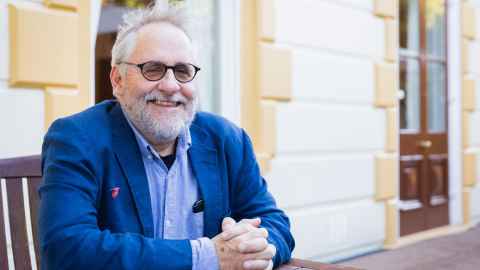Peter Adams: 'We need to stop profiting from other people's misery'
5 July 2019
Professor Peter Adams says it's time for a change of mindset on whether pokie machines are an acceptable funding model for our community organisations.

Peter Adams has a problem with the pokies.
The University of Auckland Professor in the School of Population Health isn’t addicted, but is committed to raising awareness of what he says is a major social issue.
Professor Adams says around a quarter of community sector funding in New Zealand comes from gambling and goes to schools, charities, sports organisations, cultural activities and health services.
“What’s problematic is that a big proportion, as high as half, is coming from people with issues with gambling.
“We have built a long-term relationship with a sector that gets its money from people who have problems. Our ‘fun’ is reliant on sources that cause serious harm.”
He says this reliance on funding from gambling sources such as slot machines, or pokies as they are known, took off in the 1990s.
“First we had the kind of benign fundraiser – bingo, housie nights, raffles, that kind of thing. But once we commercialised gaming, with pokies and casinos and Lotto, it moved to a high volume that maximises the amount you make out of people with problems.
“It’s now industrialised, and very different to 30 years ago when it was a cottage industry.”
Professor Adams says the way pokie rooms are set up, and their location in lower socio-economic areas, is intended to maximise profit.
“They’ve created these small rooms, usually attached to a bar and TAB. There’s no space for socialising, you’re just looking at a screen and they’re ideally suited to be anonymous and solitary.
“They’re designed to maximise the yield from people with problems.”
Maybe we could have fun using less money from gambling, knowing that we are not reliant on people’s misery.
He says what’s required is an awakening by society to the relationship between income generated by the pokies and misery.
“If people thought about the consumption of profits a bit more, maybe they’d be less inclined to take money from these sources. It requires a change of mindset.”
An example of a similar change in thinking was seen recently when a Gull service station owner decided he “didn’t really want to be profiting from other people’s misery” and so made the decision not to sell cigarettes.
Professor Adams says a change in funding model is needed for our kindies, sports clubs and the like.
“Maybe for a while we could have fun using less money from gambling, knowing that we are not reliant on people’s misery.”
He says Norway took an innovative approach to breaking the pokie revenue cycle by banning all electronic gaming machines in 2007.
“They closed down the pokies for two years and when they brought them back, they were less potent and under the sole control of the government,” he says.
“They were configured to make them less harmful – with mandatory breaks, lower bets and lower prizes.”
They also placed the machines in more social settings rather than in dingy, solitary situations.
Professor Adams says this is important.
“The closest match to a room like our gaming machine rooms is a urinal – dark, no eye contact, not a lot of talk.”
Professor Adams, who is associate director of the Centre for Addiction Research, will give a lecture on 10 July. It's entitled ‘Pokies fund my kindy: New Zealand’s reliance on gambling’.
His lecture is part of the Winter Lecture Series, the theme for which is ‘Addiction in the Changing World of Dangerous Consumptions’, and which runs every Wednesday lunchtime until 14 August. Each lecture provides an opportunity for informed debate led by experts from the University of Auckland, AUT and Massey. Lectures are free to attend.
A version of this article first appeared in the July issue of the University of Auckland UniNews.